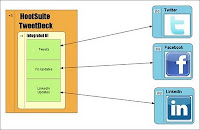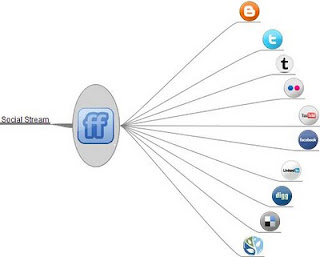Which is the best Social Aggregator ? There is a lively discussion going on a LinkedIn group over this question in which I have participated but think my thoughts on the topic required a more open and more personal space - this blog. This post in a threaded conversation involving a lot of participants would only disrupt the flow.
So what is a Social Aggregator ?
Wikipedia defines it as "is the process of collecting content from multiple social network services, such as MySpace or Facebook. The task is often performed by a social network aggregator, which pulls together information into a single location,[1] or helps a user consolidate multiple social networking profiles into one profile."
However, not everyone is willing to accept the definition and to a large extent they are justified in disregarding it. After all, Social Web is a rapidly changing scenery, can a definition phrased two year back have the same relevance in Real-time Web ? Coming back to the original discussion, I found a lot of people describe HootSuite and TweetDeck as Social Aggregators. Initially,it was a little confusing,why would tools that merely help users connect to social networking services be considered aggregators? Fundamentally, they are not very different from the traditional Client/Server architecture that almost all database software are based on!
But later on it began to make sense, social technology is a different ball game, drawing analogy with the traditional software development methodology may not be correct. Taxonomically, a software is termed "social" based on its usage rather than its underlying architecture [source]. After all, tools like HootSuite,TweetDeck and others do let you manage multiple social networks from one place. But then,even your iGoogle startup page can be described as an aggregator and a better one, in a manner, since it not only offers gadgets to integrate its other services like GMail, Google News etc, it also allows developers to quickly create and distribute gadgets connecting to almost every site which supports XML.
But there still remains a difference between these tools and the actual concept of Social Aggregator. An iGoogle gadget is simply a container, encapsulating information stored elsewhere. For instance, in the screen shot above, gadget displaying Facebook streams is completely independent of the Twitter stream. The same applies to all other gadgets, they are mini-applications that expose a considerably less but key data or features from larger applications. The Twitter gadget for instance, simply fetches XML file representing my timeline and displays it after formatting...
As the above diagram demonstrates, tools can pull data from multiple services and display them at one place, but the streams themselves remain independent of each other. A Social Aggregator, on the other hand can take streams from multiple sources and generate a unified social stream also referred to as lifestream (I tend to differentiate between social stream and lifestream but Wikipedia describes FriendFeed as a Lifestreaming service). Additionally, other typical Aggregator features including the basic features of all social networking sites, including features to update status, connect to other users and groups, follow what your friends are doing on various social websites. At the same time, your friends can view all your social web activities (blogging, tweeting,bookmarking,commenting and networking with other people) at one place i.e. your Aggregator profile.












0 comments :
Post a Comment